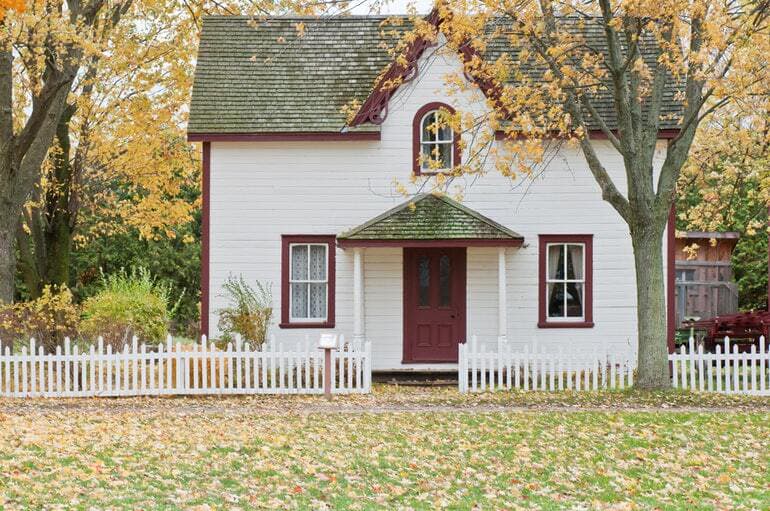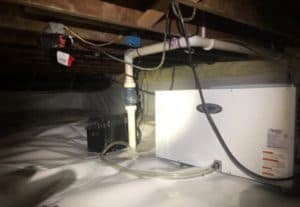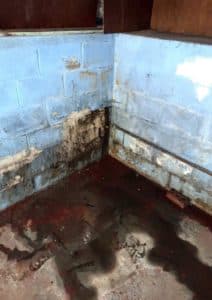How to Get Rid of a Musty Smell in the Basement

Originally posted 11/16/18, Revised by Kelly Kater 07/16/20
No one wants their home to smell. At least, no one wants their home to smell bad. It can smell like clean laundry, or baked cookies, or whatever seasonal scent you’ve chosen. But musty? Musty isn’t going to be a top seller in any candle shop and for good reason.
If your basement smells musty, then you have a moisture issue. A musty odor can be coming from a number of culprits, but the root cause is going to be water.
Acculevel has been waterproofing basements and crawl spaces since 1996, and we’ve resolved moisture issues for thousands of homeowners. The sooner we can help you restore your home to a healthy (and pleasant-smelling) condition, the sooner your quality of life will improve.
In this article, we’re going to outline some steps you can take, and explain when you need to consult a professional.
Humidity
Do you know what the humidity level is in your basement? You can purchase a hygrometer at your local hardware store and get a precise reading. But most of the time, a little retrospection will give you a ballpark number.
The ideal relative humidity level (often abbreviated as RHL) is between 30%-50%. If you have musty odors in your basement, your RHL is over 50%. If the air is clammy, it’s closer to 60%. Once a space gets much above 60% RHL, you will have visible moisture like condensation.
If you have high humidity in your basement, it will affect any textiles in that space. This can be carpets or padded furniture in a finished basement; it can be clothes or toys stored in an unfinished basement. Once you have the humidity under control, these textiles will need to be laundered or steam-cleaned (according to direction) to remove the lingering musty odor. The good news is, you shouldn’t have to repeat this step as long as you have a quality dehumidifier in place.
 This photo was taken by an Acculevel crew member after encapsulating a crawl space. The whole-house dehumidifier is set up to drain into the sump pump pit next to it.
This photo was taken by an Acculevel crew member after encapsulating a crawl space. The whole-house dehumidifier is set up to drain into the sump pump pit next to it.
There are a wide range of dehumidifiers out there, from small room-sized to whole-house capacity. Acculevel serves Indiana and the surrounding states; because of the heavy summer humidity in the Midwest, we recommend that our customers invest in a whole-house style. This is something you can install yourself, if you are so inclined. We’ve published a list of the top 5 dehumidifiers for 2020, here.
Mold
If you have enough humidity to collect in the air (this is what makes air feel clammy), it’s entirely possible that you have mold developing somewhere in the basement. Mold is another likely source of the odors in your home. If you do not have allergies, or any respiratory issues, you may be comfortable to search for this yourself.
If you DO have allergies or respiratory conditions, please find a professional to assist you. Mold can cause significant problems for even the healthiest person; don’t expose yourself more than necessary. If you find mold in your home, consult a professional. Mold removal is difficult to do thoroughly and properly. The Environmental Protection Agency recommends that any mold problem larger than 10 square feet be examined by an expert.
 This photo was taken by an Acculevel project manager during a free estimate appointment. The basement has mold and standing water in one corner.
This photo was taken by an Acculevel project manager during a free estimate appointment. The basement has mold and standing water in one corner.
Not sure if you need mold treatment? Sales Director Nolan Beery addresses that here:

Water Leaks or Standing Water
If you have any leaks or standing water in your basement, this needs to be addressed before anything else. It won’t do you any good to treat symptoms (like humidity and mold) if you don’t cure the source. Foundations are made of concrete or brick, and these are porous surfaces that can admit water. If water is seeping through your foundation, you have hydrostatic pressure developing and you will need a professional to install an effective water drainage system.
However, there are some steps you can take to reduce the water around your foundation. The first is to check the grading around your home. When the landscaping was installed, the ground should have been sloped down and away from the house. This encourages a natural water flow into your yard and away from the foundation. If this has been reduced or compromised by erosion, the grading should be corrected promptly.
You should also check your guttering for any cracks or blockages. A hard rain can deliver a significant amount of water at a fast rate. Compromised gutters can allow rainwater to overflow along the foundation. After verifying (and possibly repairing) your gutters, you should also evaluate your downspouts.
We recommend that downspouts drain water a minimum of 10 feet away from your home. Installing downspout extensions is another potential DIY project. In this article, we explain why downspouts should be extended and the best practices for how it should be done.
Do You Need Basement Repairs in Your Home?
If so, you should find an experienced foundation company, and make an appointment. Before you sign a contract for any service, we urge you to always verify the company is reputable, insured, and accredited by the Better Business Bureau.
If you live in our service area, contact Acculevel. If you have noticed any problems and would like an evaluation, you can request a free estimate. An experienced project manager will examine the areas of concern and recommend the best course of action for you, to keep your home strong and healthy for years to come.
